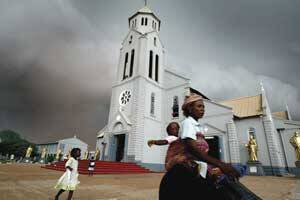As Catholic leaders gather in Rome for the Second Synod of Bishops for Africa, the chief concern of the African bishops is that the ethnic disputes that have divided the continent for generations threaten the unity of the church today.
“Our ethnic differences are a good and beautiful thing, which God bestowed to show how his image can be seen in many ways,” Cardinal Peter Turkson of Cape Coast, Ghana, said during a visit to the United States from Sept. 19 to 22. “Yet they have become a great stumbling block hindering the cohesiveness that needs to exist in the church.” Cardinal Turkson cited tribal violence in Uganda, Rwanda, Nigeria and Kenya that has resulted in the deaths and forced resettlement of millions of people.
“Politicians have made use of this to further their own ends and to cause division, creating a tremendous challenge to our efforts as Catholics to be part of one great family in the strong tradition of African families,” said Cardinal Turkson, who has been charged with preparing two major papers for the synod.
The official theme of the synod, which begins on Oct. 4 and continues through Oct. 25, is “The Church in Africa in Service to Reconciliation, Justice and Peace.” Participants will hear reports on the continent’s many simmering conflicts. In this sense, the synod will spotlight the “forgotten wars” that are no longer on the media radar but cause daily suffering.
The working document for the synod calls on the church to be a mediator among parties in conflict. Yet as Pope Benedict XVI has emphasized, the church cannot be a healing and reconciling force in society unless it is a “community of persons reconciled with God and among themselves.”
The bishops also plan to discuss relations between Muslims and Christians. Cardinal Turkson, who at age 61 is Africa’s youngest cardinal and will serve as the synod’s recording secretary, said relations between the two religions in his own nation are cordial, and he anticipates they will remain that way. Still, he and other bishops are concerned about the growing tendency to politicize religious affiliation, especially in regard to Islam.
“The last few decades have brought to some places a type of Islam different than what we’re used to,” said Cardinal Turkson. “This is a more aggressive form, one which seems to have more of a spirit of competition than cooperation.”
Among the other issues the synod will address are:
1) Inculturation. The synod is expected to take up the debate started at the first synod for Africa in 1994 about the inclusion of local traditions in liturgical celebrations. That synod allowed for some flexibility in this regard as long as the essential elements of the liturgy were not altered.
2) The family. The bishops will likely hear criticism of development programs that promote contraception and abortion. The synod’s working document also calls upon the church to come up with creative responses to the spiritual and moral needs of families.
3) Strengthening the role of the laity. The synod preparatory council called for the African laity to take a greater role in politics, the armed forces, the economy, education, health and the media. The bishops are also expected to discuss strategies for improving religious education among the faithful and making better use of the continent’s 400,000 catechists.
4) Economic justice. The effects of globalization and the current economic crisis will be addressed, along with the importance of continued international aid to Africa. At the same time, the synod’s working document has also argued for greater economic self-sufficiency by local church communities and cautioned against dependency on outside assistance.








